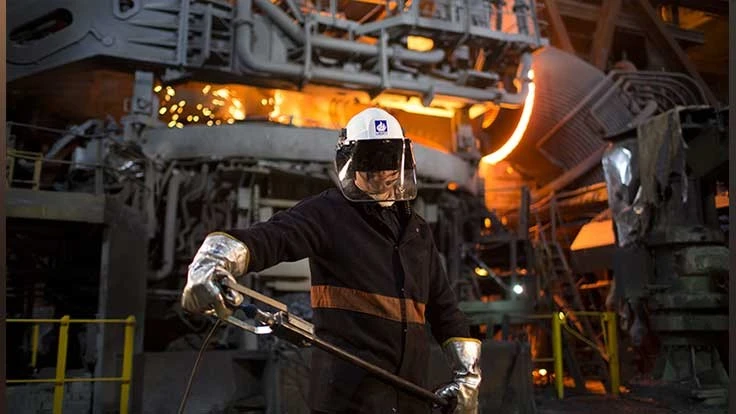
Liberty Steel Group
Liberty Steel Group, part of London-based GFG Alliance, has announced plans to form a single global company with 18 million metric tons of rolled steel capacity annually through a consolidation of GFG Alliance’s steel businesses. According to a news release from Liberty Steel, the company also has a goal to lead the industry toward a carbon-neutral future.
Liberty Steel Group, which employs about 30,000 people in 10 countries, will be incorporated by the end of this year through a merger of GFG Alliance’s upstream and downstream steel manufacturing, mining and distribution businesses around the world. As a result, Liberty Steel Group will be the eighth largest steel producer outside of China, with operations stretching from Australia to continental Europe, the United Kingdom and the United States, and it will have annual sales of about $15 billion, Liberty Steel Group reports in a news release on the merger. Although individual businesses will retain a high degree of autonomy, the company reports that consolidated accounts will be produced and a united strategy will be developed.
“We are creating a new force in steel with the size, scale and agility to forge a path towards a sustainable future for our steel businesses and the communities in which we operate,” said Sanjeev Gupta, executive chairman and CEO at GFG Alliance, during World Steel Dynamics’ European Conference in Milan on Oct. 29. “Our integrated group will stretch around the world, with a financial and governance structure suitable for an intercontinental business of our size.”
Liberty Steel Group will include operations drawn from Liberty House in the U.K., Liberty Steel Continental Europe, Liberty Steel USA, Infrabuild and Liberty Primary Steel and Mining Australia. The company reports that it will be organized in three divisions: Liberty Primary Steel, Liberty GreenSteel and Liberty Engineered Steel.
According to Liberty Steel Group, the merged group’s strategy will encompass a balanced model, including transitioning our existing blast furnaces toward electric arc furnaces (EAFs), investing in new EAFs and piloting new clean technologies around the world. It will aim to tackle emissions at its sites by exploring technologies such as direct-reduced iron, carbon capture and storage and it will continue to participate in the development of various forms of renewable energy through its sister company SIMEC Energy.
Achieving carbon-neutral status
In addition, Liberty Steel Group reports plans to build on GFG Alliance’s existing Greensteel strategy to aim for net carbon-neutral status by 2030. Part of this plan includes the exploration of the best use of new technologies such as hydrogen generated from renewable power to produce steel. The company reports that it hopes to become the first carbon-neutral steel company in the world.
The Greensteel strategy focuses on using EAFs to recycle scrap steel rather than producing all materials from scratch, as well as using renewable sources of energy. Steel from recycled scrap using fossil-fuel based energy generates less than a third of the carbon dioxide emissions compared with primary steelmaking, with the benefit dramatically increasing to almost zero emissions with the use of renewable power in Greensteel, Liberty Steel Group reports in a news release on its Greensteel goals. Liberty’s plants already recycle 3 million metric tons of scrap steel annually, with investment underway in EAFs in the U.K., Australia and the U.S.
Additionally, the company reports that its sites are working to reduce transport emissions, cut electricity use and minimize waste. According to a news release from Liberty Steel Group, renewable energy initiatives include the Cultana solar farm in Australia, Glenshero wind farm in Scotland and Newport waste-to-energy project in Wales.
“Steel is the building block of modern life and the GFG Alliance has always put sustainable strategies at the heart of its business model,” Gupta said during the World Steel Dynamics European Conference in Milan. “We recognize that becoming carbon neutral by 2030 is a very ambitious target but we have firm foundations already with our Greensteel strategy in motion, and with technical viability of hydrogen usage for direct reduced iron now proven it gives us the confidence that such developments allow us to aim even higher with our goals. As a responsible business, the legacy we pass on to future generations is every bit as important as our bottom line. Liberty Steel aims not just to produce top-quality steel but to be an agent of change in the industry. In doing so, we can open the door to the reindustrialization of the developed world by reviving and restoring often neglected industry.”
Get curated news on YOUR industry.
Enter your email to receive our newsletters.
Latest from Recycling Today
- Unifi launches Repreve with Ciclo technology
- Fenix Parts acquires Assured Auto Parts
- PTR appoints new VP of independent hauler sales
- Updated: Grede to close Alabama foundry
- Leadpoint VP of recycling retires
- Study looks at potential impact of chemical recycling on global plastic pollution
- Foreign Pollution Fee Act addresses unfair trade practices of nonmarket economies
- GFL opens new MRF in Edmonton, Alberta





